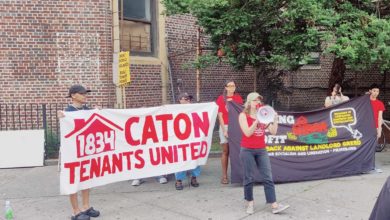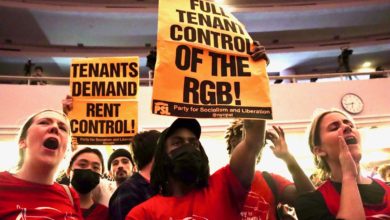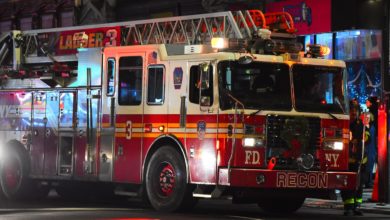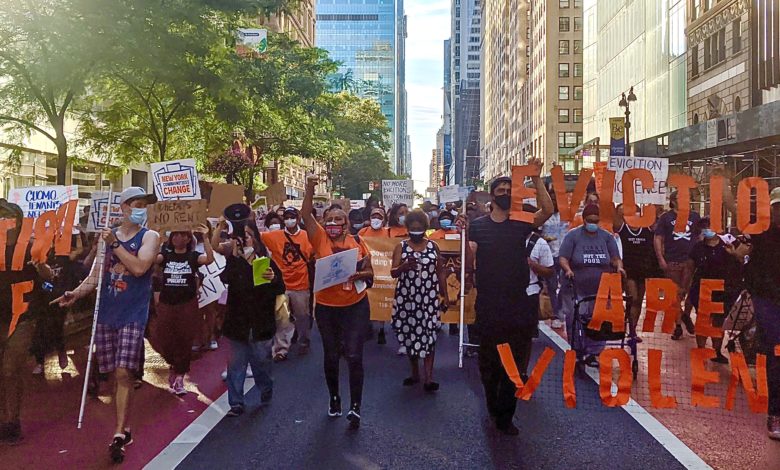
Liberation Photo
Activists ranging from trade unionists, housing justice organizers and socialists to young people new to the struggle, united for a 300-person rally and march in New York City on Aug. 20. They demanded the cancellation of rents and a stop to the upcoming wave of evictions that was ignited by the pandemic.
Starting at the New York Public Library in the heart of corporate Manhattan, the protest brought attention to the real roots of the housing crisis and high rents: private investors and large firms that treat a basic human right as a financial game for profit. As part of their campaign ongoing since mid-July, lead organizers Housing Justice for All and Right to Counsel NYC listed three unifying demands at the action, each with a corresponding bill in the New York State Legislature:
Universal Rent Cancellation (A8802/A10826); An Eviction Moratorium for the duration of the state of emergency + 1 year after the emergency is over (S8667/A10827); Housing the Homeless immediately (S7628A/A9657).
Demonstrators rallied to the headquarters of the notorious Blackstone Group, a private-equity firm accused by the United Nations of “wreaking havoc” on tenants worldwide. The action highlighted how it is investors and firms like Blackstone that fuel housing crises before and during the pandemic in New York, nationally and worldwide.
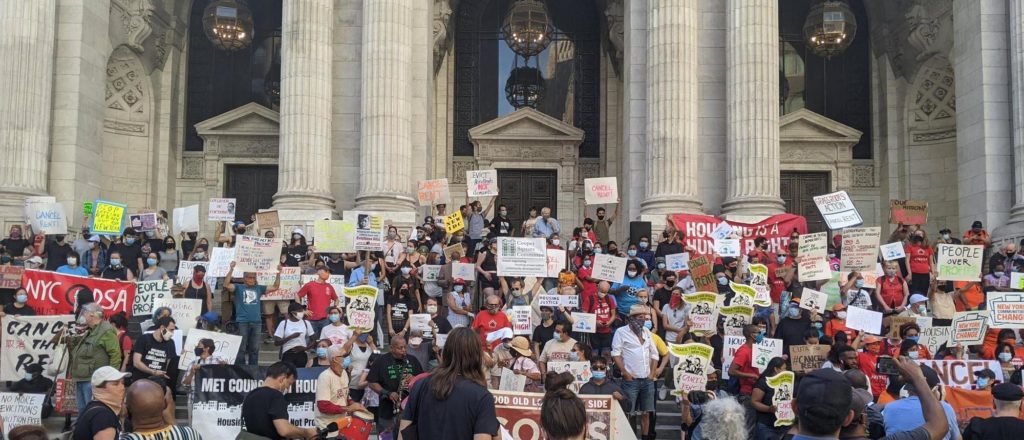
Many speakers emphasized that when closely examined, the last minute rent and eviction moratoriums put in place by the state barely protected anyone. Liberation News gathered quotes and spoke with protesters to share their thoughts:
Tiffany Khan, from Met Council on Housing, explained: “We HAD a housing crisis before COVID, and what COVID has done is exacerbate that crisis. … One thing that most New Yorkers don’t know is the cost of putting a family in a homeless shelter.” She said that if a family has fallen behind on rent, even if it’s just a few thousand dollars, it’s significantly cheaper to pay the rent than house them in a shelter.
Khan added: “We have more corporate bailout in the form of J51 and 421A tax abatements to corporate landlords. … So if you were to just take away those tax abatements and put that money into the families who are just trying to remain in their homes, you could solve this housing crisis.”
Ngozi, from Community Action for Safe Apartments exclaimed: “People are suffering in this pandemic. Children are crying, mothers are crying, having anxiety. They should try to help it, they should try to help us to have a rent freeze. Because a lot of people can’t afford to pay rent anymore because they canceled salaries.
“I personally believe that housing shouldn’t be for profit, especially not in New York City, said Lorena, a protester.
Lavi, who had come from Brooklyn, said: “I live in Bed Stuy, and just look outside my window and there’s homeless people outside, and they’re mainly Black, mainly people of color. And they’ve been here generations longer than I have as a refugee. So you don’t have to even really talk to somebody, you just walk around New York to see it.”
The Party for Socialism and Liberation joined this action. In its Cancel the Rents campaign, this group has been fighting for a national cancellation of all rents, mortgages for homeowners, small landlords and small business, for the duration of the pandemic; no shutoff of gas, electricity and water utilities, the restoration of utilities for households that are currently shut off for lack of ability to pay, no accumulation of debt; and eminent domain over vacant buildings, homes, hotels, all appropriate structures to house the homeless or people in precarious housing situations, including the undocumented and victims of domestic violence.
The march ended with chanting and a protest party outside of the Real Estate Board of New York, another major contributor to the housing crisis. Here, protesters danced together out of love for tenants’ rights and the struggle.
As of this writing, courts are still processing pre-COVID 19 eviction cases, with a halt on enforcing any evictions until Oct. 1.



